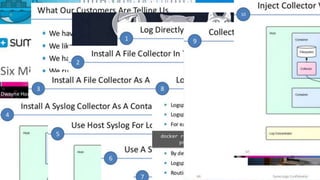

–until and -since – These flags let you fetch lines logged during a particular time period.–timestamps – Display complete timestamps at the start of each log line.The docker logs command supports several flags that let you adjust its output: This is equivalent to using tail -f with regular log files on your machine. If you’d like to keep streaming new logs, add the -follow flag to the command. The logs command prints the container’s entire log output to your terminal. You can use docker ps -a to get the IDs and names of your containers. Replace my-container with the name or ID of the container you want to inspect. To view container logs, use the docker logs command: docker logs my-container For stopped containers, you can access all the logs captured prior to the termination.

When a container’s running, you can stream logs in realtime. You can view container logs at any time during a container’s lifecycle. You should make sure your containers log errors to stderr so Docker commands are able to expose them. Logs will only be available if the foreground process in your container actually emits some output.

The logs contain the output you’d see in your terminal when attached to a container in interactive mode ( -it). You can easily monitor logs to understand what’s going on in your containers. docker-compose-mixer.yml (опция -i, -input-file может определить другое имя для файла)ĭEBUG:root:Start compiling compose file.ĭEBUG:root:Input file: /Users/paunin/Sites/dc-mixer.local/examples/example2/proj/docker-compose-mixer.yml output file: docker-compose.ymlĭEBUG:root:Save result scope in the file "docker-compose.Docker automatically aggregates container standard output and error streams ( stdout/ stderr) into log feeds which are retained by the Docker daemon. images/mail/spamassassin:/tmp/spamassassin/


 0 kommentar(er)
0 kommentar(er)
